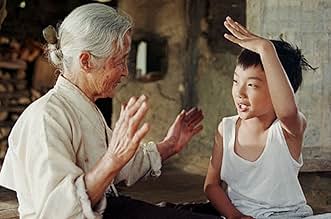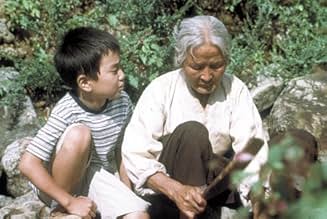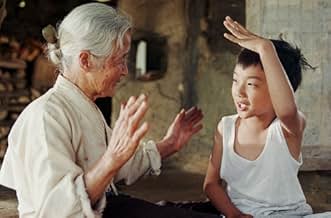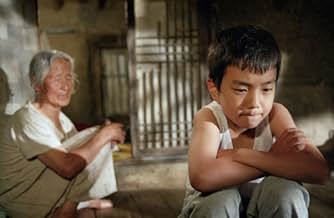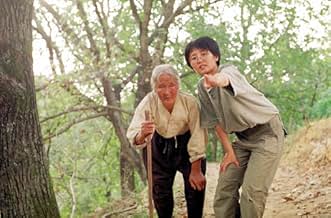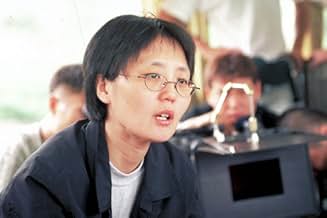IMDb-BEWERTUNG
7,7/10
6135
IHRE BEWERTUNG
Füge eine Handlung in deiner Sprache hinzuThis is the story of a 7-year-old boy, Sang-woo, born and raised in the big city, and his mute grandmother, who has spent her whole life in a small rural village.This is the story of a 7-year-old boy, Sang-woo, born and raised in the big city, and his mute grandmother, who has spent her whole life in a small rural village.This is the story of a 7-year-old boy, Sang-woo, born and raised in the big city, and his mute grandmother, who has spent her whole life in a small rural village.
- Auszeichnungen
- 12 Gewinne & 10 Nominierungen insgesamt
Empfohlene Bewertungen
I saw this movie a few weeks ago in my korean school, and thought it was pretty good. I had just recently found out that it was out in theatures. The grandma is a simple, loving mute and deaf grandmother, forced to take care of her daughter's whiny son. The boy does everything to annoy his grandmother, making me (and others, i bet) to smack that annoying brat upside the head and give him a good kick. Overall, it is an okay movie, but nothing i'll remember all my life. 7/10
Commenter mwprods wrote below on date: 8 October 2002, this film "could probably flourish and impress even as a silent film." There is very little dialogue because the grandmother is a mute. This was a plus for me because for once I was able to keep up with the subtitles in a foreign film. Kidding aside, I was astonished by how such a quiet film touched me so. It makes me want to reevaluate my disdain for films from the silent film era. (I think I will hunt down "Metropolis" - I've heard critics speak highly of the silent film.) If you scan through all of the other comments you get suggestions for other films similar to Jibeuro (The Way Home).
From reading the other comments I was surprised to learn that it was the top grossing film of its year in South Korea. I know nothing about South Korea's film industry, but since it exports cars to the USA (Hyundai, Kia, etc), I assumed that their film industry would be similarly advanced. If it is, it is a pleasant surprise indeed that such a small film with first time actors ended up on the 'top of the heap'.
Imdb's page on the movie says that its available in DVD. I recommend people rent this sweet tale on a laid back weekend.
I plan to adopt a child within the USA's foster care system - many of which are difficult children. The grandmother character in this film showed me that with patience and persistence over possibly a long period of time one may get through to a difficult child - this film gave me more confidence that I could be successful as a foster parent.
From reading the other comments I was surprised to learn that it was the top grossing film of its year in South Korea. I know nothing about South Korea's film industry, but since it exports cars to the USA (Hyundai, Kia, etc), I assumed that their film industry would be similarly advanced. If it is, it is a pleasant surprise indeed that such a small film with first time actors ended up on the 'top of the heap'.
Imdb's page on the movie says that its available in DVD. I recommend people rent this sweet tale on a laid back weekend.
I plan to adopt a child within the USA's foster care system - many of which are difficult children. The grandmother character in this film showed me that with patience and persistence over possibly a long period of time one may get through to a difficult child - this film gave me more confidence that I could be successful as a foster parent.
I've not seen anyone depict better the bittersweet relationship between a spoiled child and his patient grandmother than Korean director Lee Jeong-Hyang's ` The Way Home.' Nothing spectacular happens during seven-year-old Sang-woo's visit to grandmother's home in a rural village after his single mother drops him off. Changes occur, albeit predictably; the glory is in the small matters that will matter much to the boy as he matures long after the visit.
Why won't this film make it big if I like it so much? Well, the kid kills no one, smokes nothing, and speaks in child language, so audiences might just yawn. Additionally, the boy is a poor actor who hasn't been directed well. But grandma, now there is an actress. Kim Eul-boon was discovered in her native village, 78 years old and never seen a movie! Hunched over, skin leathery and crinkled, expressions minimalist, she embodies the infirmities of old age and the resolution of a tough spirit to care for herself and other ancient neighbors to the last breath. Her grandson, abusive and self-centered, is just another person to care for who she knows is worth saving, in unconditional love probably unacceptable to aggressive Americans.
When grandson plays with neighbor kids, he learns about the life's dangers by experiencing the menacing bull regularly chasing them down a particular stretch of necessary road. When he longs for the companionship of a neighbor girl, he learns you have to work at love. When he looks for grandma's love, he finds it in her smallest gestures, like buying and cooking him a chicken she thinks he wants when all he really wants is KFC.
And so this country life goes on with the boy erratically moving from resentment to love and back again in an endlessly ambivalent cycle. The batteries he uses up for his electronic games serve as metaphor for his city life's wasteful and empty energy.
The semi-modern buses coming to and from the market also serve as emblems of the tenuous relationship between city and province, grandmother and daughter, grandmother and grandson. So real is the slow and unglamorous rural life that you know Hyang has understood accurately that life and love are served slowly through its minor moments.
I guarantee you will never forget the charismatic grandmother outfitted as a lowly peasant-she is a survivor and one hell of an actress. The film is dedicated to all grandmothers. `Here's looking at you, Kid.'
Why won't this film make it big if I like it so much? Well, the kid kills no one, smokes nothing, and speaks in child language, so audiences might just yawn. Additionally, the boy is a poor actor who hasn't been directed well. But grandma, now there is an actress. Kim Eul-boon was discovered in her native village, 78 years old and never seen a movie! Hunched over, skin leathery and crinkled, expressions minimalist, she embodies the infirmities of old age and the resolution of a tough spirit to care for herself and other ancient neighbors to the last breath. Her grandson, abusive and self-centered, is just another person to care for who she knows is worth saving, in unconditional love probably unacceptable to aggressive Americans.
When grandson plays with neighbor kids, he learns about the life's dangers by experiencing the menacing bull regularly chasing them down a particular stretch of necessary road. When he longs for the companionship of a neighbor girl, he learns you have to work at love. When he looks for grandma's love, he finds it in her smallest gestures, like buying and cooking him a chicken she thinks he wants when all he really wants is KFC.
And so this country life goes on with the boy erratically moving from resentment to love and back again in an endlessly ambivalent cycle. The batteries he uses up for his electronic games serve as metaphor for his city life's wasteful and empty energy.
The semi-modern buses coming to and from the market also serve as emblems of the tenuous relationship between city and province, grandmother and daughter, grandmother and grandson. So real is the slow and unglamorous rural life that you know Hyang has understood accurately that life and love are served slowly through its minor moments.
I guarantee you will never forget the charismatic grandmother outfitted as a lowly peasant-she is a survivor and one hell of an actress. The film is dedicated to all grandmothers. `Here's looking at you, Kid.'
"Love makes us lessen our selfish and self-centered view of the world. Even the smallest kind word, or gentle loving gesture, has repercussions in the infinite
"- Lama Surya Das
Unconditional love is the ability to love someone exactly the way they are and the way they are not, without judgment or evaluation. With this kind of unconditional love, the well being of others becomes more important to us than our own. Spiritual teachers tell us that if we can silence the constant chattering of the mind, we can get in touch with this capacity. I know it is a big stretch for me, but for the wise old grandmother in the South Korean film, The Way Home, it is second nature. This film by Lee Jeong-hyang, one of Korea's few female directors, is this year's biggest box-office hit in South Korea and the first Korean film to receive major studio distribution in the United States. The grandmother, played with startling authenticity by first-time actress, 78 year-old Kim Eul-boon, conveys without speaking the redeeming power of love. Like the young Aboriginal girls in the Australian film Rabbit-Proof Fence, Kim had never even seen a movie before she was discovered in a talent search among rural villagers.
In The Way Home, Sang-woo (Yoo Seung-ho), an insufferable seven-year old boy from Seoul, is deposited at his grandmother's house in the remote village of Youngdong in Korea's Choongbuk province so the mother can have time to look for work. The grandmother's posture is stooped and her face is withered from years of hard work and she suffers from a chronic disability and cannot speak. She lives in a wooden hut carved into the hillside and the stunning cinematography magnificently captures the beauty and remoteness of this mountain retreat. Sang-woo is about the most spoiled and irritating boy that I have ever seen in films and one that would try the patience of St. Francis of Assisi. Full of street-smart know-it-all, he marches into grandma's home with his electronic toys, cans of Coca-Cola and Spam, and starts calling her dummy and byungshin (retard). When she asks what he wants to eat, he tells her "pizza, hamburger, and Kentucky Fried Chicken". She walks all the way to town to buy him a chicken but he won't eat it (until he is too hungry to resist) because it is boiled in a pot and not fried, Colonel-style.
Despite everything the boy does to her including stealing her shoes so she has to walk barefoot and removing a clasp for her hair so he can sell it to buy batteries for his Game Boy, she remains centered and loving. Rather than refusing to cater to his every whim, she becomes increasingly generous, cleaning and cooking for him and overlooking his stealing. He begins to accept the new lifestyle, helping his grandmother to thread a needle, hang up clothes on the clothesline, and shop with her at the market. Gradually he also learns about the meaning of kindness when he sees his grandmother give a package of vitamins to a dying man, and when a neighborhood boy, Hae-yeon (Yim Eun-kyung) forgives him for teasing him about a "crazy" runaway cow.
When Sang-woo's mother comes back to retrieve him, though undemonstrative, he has clearly changed. I was expecting a saccharine payoff, but Ms. Jeong-hyang wisely stays away from a melodramatic farewell that would be out of sync with the rest of the film. Besides, it isn't about the destination but the journey, and Sang-woo in his sojourn with grandma has learned some valuable lessons that become apparent by the end of the film. The Way Home is dedicated to all grandmothers around the world and speaks volumes about the power of loving-kindness to heal the hardest heart. Reminiscent of the Iranian film, The Wind Will Carry Us by Abbas Kiarostami, this is not just the umpteenth variation on the city slicker versus country bumpkin theme but a refreshing look at what truly makes a difference in life. With a lovely score by Kim Dae-hong and Kim Yang-hee, it is yet another example of the emotional power of films that do not require a huge budget, mind-boggling complexity, special effects, or even dialogue to work their magic. And magic it is indeed Have you hugged your grandmother lately?
Unconditional love is the ability to love someone exactly the way they are and the way they are not, without judgment or evaluation. With this kind of unconditional love, the well being of others becomes more important to us than our own. Spiritual teachers tell us that if we can silence the constant chattering of the mind, we can get in touch with this capacity. I know it is a big stretch for me, but for the wise old grandmother in the South Korean film, The Way Home, it is second nature. This film by Lee Jeong-hyang, one of Korea's few female directors, is this year's biggest box-office hit in South Korea and the first Korean film to receive major studio distribution in the United States. The grandmother, played with startling authenticity by first-time actress, 78 year-old Kim Eul-boon, conveys without speaking the redeeming power of love. Like the young Aboriginal girls in the Australian film Rabbit-Proof Fence, Kim had never even seen a movie before she was discovered in a talent search among rural villagers.
In The Way Home, Sang-woo (Yoo Seung-ho), an insufferable seven-year old boy from Seoul, is deposited at his grandmother's house in the remote village of Youngdong in Korea's Choongbuk province so the mother can have time to look for work. The grandmother's posture is stooped and her face is withered from years of hard work and she suffers from a chronic disability and cannot speak. She lives in a wooden hut carved into the hillside and the stunning cinematography magnificently captures the beauty and remoteness of this mountain retreat. Sang-woo is about the most spoiled and irritating boy that I have ever seen in films and one that would try the patience of St. Francis of Assisi. Full of street-smart know-it-all, he marches into grandma's home with his electronic toys, cans of Coca-Cola and Spam, and starts calling her dummy and byungshin (retard). When she asks what he wants to eat, he tells her "pizza, hamburger, and Kentucky Fried Chicken". She walks all the way to town to buy him a chicken but he won't eat it (until he is too hungry to resist) because it is boiled in a pot and not fried, Colonel-style.
Despite everything the boy does to her including stealing her shoes so she has to walk barefoot and removing a clasp for her hair so he can sell it to buy batteries for his Game Boy, she remains centered and loving. Rather than refusing to cater to his every whim, she becomes increasingly generous, cleaning and cooking for him and overlooking his stealing. He begins to accept the new lifestyle, helping his grandmother to thread a needle, hang up clothes on the clothesline, and shop with her at the market. Gradually he also learns about the meaning of kindness when he sees his grandmother give a package of vitamins to a dying man, and when a neighborhood boy, Hae-yeon (Yim Eun-kyung) forgives him for teasing him about a "crazy" runaway cow.
When Sang-woo's mother comes back to retrieve him, though undemonstrative, he has clearly changed. I was expecting a saccharine payoff, but Ms. Jeong-hyang wisely stays away from a melodramatic farewell that would be out of sync with the rest of the film. Besides, it isn't about the destination but the journey, and Sang-woo in his sojourn with grandma has learned some valuable lessons that become apparent by the end of the film. The Way Home is dedicated to all grandmothers around the world and speaks volumes about the power of loving-kindness to heal the hardest heart. Reminiscent of the Iranian film, The Wind Will Carry Us by Abbas Kiarostami, this is not just the umpteenth variation on the city slicker versus country bumpkin theme but a refreshing look at what truly makes a difference in life. With a lovely score by Kim Dae-hong and Kim Yang-hee, it is yet another example of the emotional power of films that do not require a huge budget, mind-boggling complexity, special effects, or even dialogue to work their magic. And magic it is indeed Have you hugged your grandmother lately?
i am not an easy sell on movies. many things can strike a sour note and put me off a little bit. but i rate this movie 10 on every count. it is excellent in story, characterization, cinematography--but all of those words pull me away from what i truly want to say about The Way Home. it is beautiful on a level that few movies are. most movies that attempt the type of emotional beauty that this one does end up a bit cheesy, a bit cliché, and i am not able to take them seriously.
The Way Home simply lays out the struggle of a young boy and the quiet resilience of his grandmother, and here weeks later when i think of it i feel joy.
The Way Home simply lays out the struggle of a young boy and the quiet resilience of his grandmother, and here weeks later when i think of it i feel joy.
Wusstest du schon
- WissenswertesAt the time of casting, Kim Eul-boon (Grandmother) had not only never acted before, but never even seen a film before.
- Crazy CreditsBefore end credits: "Dedicated to all grandmothers"
- VerbindungenReferenced in Film Geek (2005)
Top-Auswahl
Melde dich zum Bewerten an und greife auf die Watchlist für personalisierte Empfehlungen zu.
- How long is The Way Home?Powered by Alexa
Details
- Erscheinungsdatum
- Herkunftsland
- Offizieller Standort
- Sprache
- Auch bekannt als
- The Way Home
- Drehorte
- Produktionsfirmen
- Weitere beteiligte Unternehmen bei IMDbPro anzeigen
Box Office
- Budget
- 2.000.000 $ (geschätzt)
- Bruttoertrag in den USA und Kanada
- 445.367 $
- Eröffnungswochenende in den USA und in Kanada
- 29.737 $
- 17. Nov. 2002
- Weltweiter Bruttoertrag
- 24.952.738 $
- Laufzeit1 Stunde 20 Minuten
- Farbe
- Sound-Mix
- Seitenverhältnis
- 1.85 : 1
Zu dieser Seite beitragen
Bearbeitung vorschlagen oder fehlenden Inhalt hinzufügen

Oberste Lücke
What is the Spanish language plot outline for The Way Home - Wege nach Hause (2002)?
Antwort


